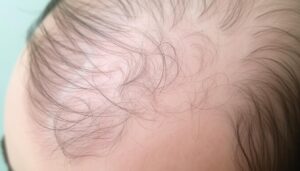Have you ever wondered why some people with lupus lose a lot of hair? This symptom can be very upsetting and often ignored, we’ll look at why it happens.

Key Takeaways
- Lupus can cause different types of hair loss, like thinning all over or patches.
- Autoimmune inflammation and some lupus treatments can lead to hair loss.
- There are treatments like topical corticosteroids, oral meds, and lifestyle changes to help.
- Strategies like getting support and using hair accessories can ease the emotional pain.
- Hair loss solution: Scalp Micropigmentation
Understanding Lupus and Its Impact on Hair Loss
What is Lupus?
Lupus is an autoimmune disease that can harm many organs and systems. It occurs when the immune system makes too many antibodies. These antibodies attack the body’s healthy cells, causing inflammation and damage.
This can lead to symptoms like joint pain, fatigue, and skin rashes.
Symptoms of Lupus Hair Loss
One common symptom of lupus is hair loss, known as lupus alopecia. This can be very upsetting for those with lupus. It can affect their self-esteem and quality of life.
Some key symptoms of lupus-related hair loss include:
- Diffuse thinning of the hair, often across the entire scalp
- Patches of hair loss, known as acute or chronic discoid lupus
- Brittle, fragile hair that is prone to breaking
- Slow or delayed hair regrowth after periods of active disease
Understanding the link between lupus and hair loss is crucial. It helps those with lupus manage their symptoms.
Causes of Lupus Hair Loss
Autoimmune Inflammation
Lupus makes the immune system attack healthy body tissues, including hair follicles. This inflammation disrupts hair growth, causing excessive shedding and thinning. It can even lead to complete hair loss.
The inflammation damages hair follicles, making it hard for them to grow strong hair.
Medications and Treatment Side Effects
Medicines for lupus, like corticosteroids and immunosuppressants, can cause hair loss. These drugs are needed to control lupus but can affect hair growth.
Understanding lupus hair loss helps take steps to address it. Scalp Micropigmentation (SMP) is a great solution for hair loss or hair thinning. It can boost confidence during the lupus journey by making your hair look thicker, and can even help your hair line.
Coping with Lupus Hair Loss
Dealing with lupus hair loss can be tough. But, there are treatments and lifestyle changes that can help. We’ll look at ways to grow hair back and boost confidence.
Scalp Micropigmentation
Scalp micropigmentation (SMP) has emerged as a revolutionary solution for individuals experiencing hair loss, including those affected by lupus and its related symptoms. For many, hair loss from lupus presents a significant emotional challenge, often leading to diminished self-esteem and confidence.
SMP offers a non-invasive way to restore the appearance of hair through the artistic application of pigments on the scalp. This technique creates the illusion of fuller hair and can significantly improve a person’s overall look, providing a sense of normalcy that many seek after struggling with alopecia lupus.
Individuals dealing with lupus often find themselves confronting unique challenges when it comes to hair loss treatment. Traditional methods such as hair transplants or medications may not be suitable or effective due to the autoimmune nature of the disease.
Here, scalp micropigmentation shines as a viable alternative. By mimicking the natural follicles on the scalp, SMP can conceal thinning areas and bald patches, providing long-lasting results that help wearers regain their confidence without needing surgical procedures.
Conclusion
All in all, there is a solid connection between Lupus and hair loss. Consider scalp micropigmentation (SMP) if you are experiencing this.
Hair loss is more than just an inconvenience — it can have a significant impact on the way that you feel about yourself. ScalpMasters can help you gain your confidence back. If you are looking to combat the symptoms of pattern baldness or the signs of hair loss, and if you want to take control of your image once again, then scalp micropigmentation may be the perfect option for you.
If you are ready to start your journey with SMP, contact us today!










